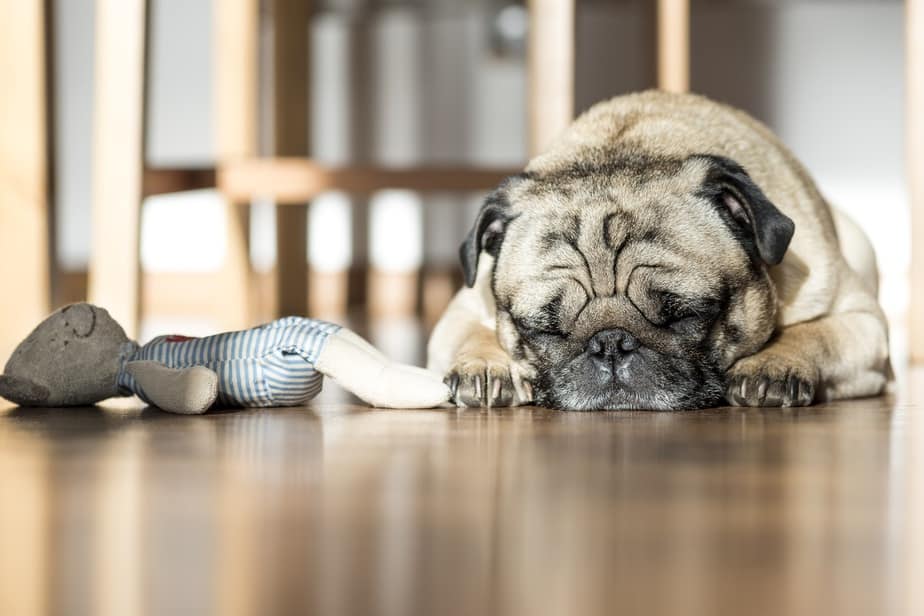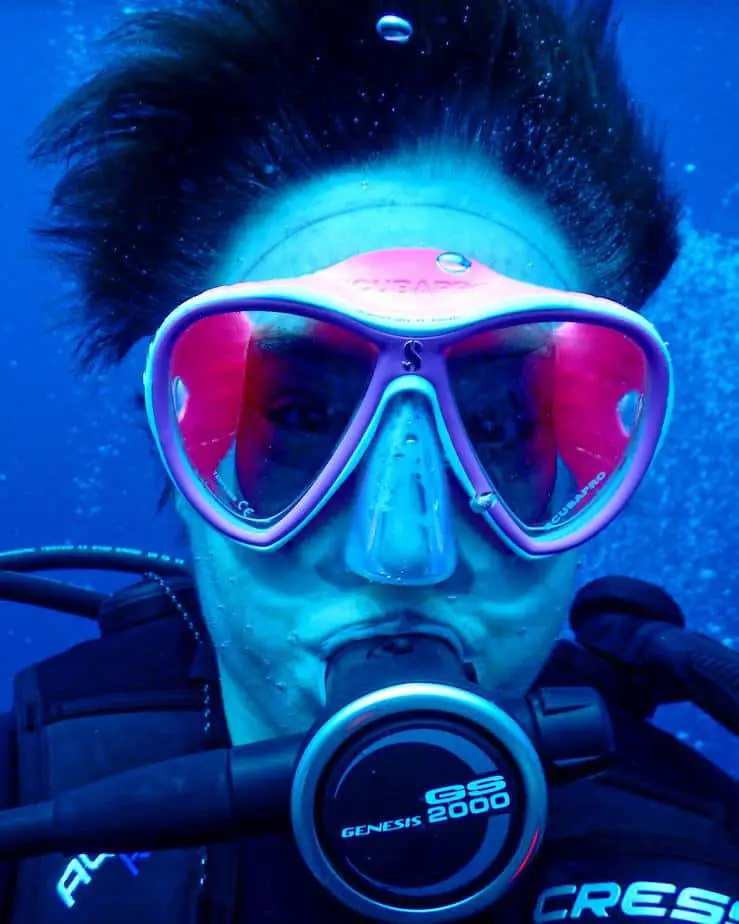On land, we take many of our natural bodily functions for granted – coughing, sneezing, even yawning – are things that we do as naturally as breathing that we don’t even think about. However, it’s a different situation underwater. If you are not careful and you unexpectedly cough, sneeze, or yawn, you might end up inhaling water instead.
Coughing, sneezing, yawning, and vomiting underwater are all ways that can unexpectedly throw a scuba diver off if they are not prepared. These actions will cause our throat to open up and release lots of pressurized air involuntarily. Depending on how you handle it, you may not get water in your mouth, but some other side effects are a change in buoyancy and possibly even injury if not dealt with properly.
In this article, we will go over the different ways our bodies react to irritants and allergens, as well as how to keep your composure and resume diving as normal after you’ve coughed, sneezed, or yawned underwater.
Coughing while scuba diving
Coughing is not concerning because air leaves your lungs and goes out of the regulator. Since the airflow only goes in one direction, you needn’t worry about swallowing any water. You will end up creating a lot of bubbles, and you might even blow the regulator out of your mouth if you aren’t prepared.
Do NOT take your regulator off to cough. Keep it on at all times, perhaps even keep your hand on the regulator for support just in case. It might feel a little uncomfortable but your regulator can handle the sharp blast of air from your coughing.
Sneezing while scuba diving
Sneezing, on the other hand, is much more intense than coughing. When you’re coughing or sneezing, your lungs will force out a large amount of air at high pressure. The purpose of this is to clear the esophagus, throat, or sinuses of any blockages. This is very useful on land, but underwater it’s trickier.
As we warned already, your regulator might get blown out of your mouth. It’s less of an issue when coughing, but it’s a serious risk when you’re sneezing since the force is much greater. We definitely recommend you keep a hand on the regulator to secure it in place. Either do that or be skilled at holding in a sneeze, though that is uncomfortable in its own way.
Another issue that sneezing presents is how it affects your mask. Sneezing affects not only the mouth but the nose as well, and the pressure can cause the mask to break its seal on your face, allowing some water to enter. You might also release some mucus directly into the mask. If you are skilled at mask clearing, this is not an issue. Simply clear the mask of any mucus and other bodily fluids. If you’re a beginner, mask clearing is a crucial skill to master to help defog your mask and clear water out, so practice it.
Can you yawn while scuba diving?
You can try to yawn underwater, but it’s not going to work like normal because you’ll just open your mouth really wide and lose your regulator. Instead, you should try to suppress the yawn.
First, keep one hand on the regulator just in case. Next, suppress the yawn by keeping your lips around the mouthpiece and not breaking your seal. What you’ll find is that as you attempt to yawn, you will end up equalizing the pressure in your ears and sinuses. Lovely.
In fact, this is one way that freedivers try to equalize their ears without using their hands. This technique is not limited to just freedivers. Even though scuba divers can use their hands, perhaps you are operating a camera or holding a bunch of equipment and don’t want to let go. In that case, learning how to do hands-free equalization would be quite useful. Try to remember the muscles used when yawning and try to mimic that on your own.
Next, let’s address the other issue – why are you yawning while scuba diving? Is it because you’re tired? We recommend getting at least 8 hours of rest the night before a dive. Also, if you’re tired because you’re physically exhausted, then you need to stay fit to have more stamina and longer bottom times when diving.
Lastly, if you’re yawning because you’re bored, well, you need to go to more interesting dive sites such as Australia’s Great Barrier Reef or Venice, Italy for some of the most beautiful beaches and pristine waters you’ll ever see.
Coughing and sneezing injuries

Coughing and sneezing can potentially cause some injuries to divers. The most serious injury is a collapsed lung. As your body forcefully pushes all of that pressurized air out, the ambient water pressure can potentially place too much pressure on your lungs, causing it to tear. If a lung is torn, air can escape from it and begin building pressure around it, preventing you from breathing.
Another prominent injury is a perforated eardrum. This can also be caused by a sudden change in pressure. In addition to the extreme pain it causes, a perforated eardrum can also be disorienting, resulting in dizziness, vertigo, and vomiting. It can cause you to lose sense of direction – which way is up, which way is down – and swim in the wrong direction. Perforated eardrums can have long-term effects like hearing loss or tinnitus.
That said, these are the worst injuries you could sustain, and they are unlikely to happen. Most of the time, it’s rare for divers to cough or sneeze underwater anyways due to how dry the air is and how few particles are in it. If you are allergic, you will be sneezing above the water and might have some lingering effects early on in your dive, hence why you might want to blow your nose.
Are you well enough to dive?

Coughing and sneezing may be symptoms of a larger problem. Are you sick with the cold or flu, or are your allergies flaring up? As frustrating and disappointing as it is to cancel a planned dive, determining if it is safe for you to dive or not should be your top priority. Here are a few things you should consider before you go diving.
Can you breathe normally through each nostril?
This might be the understatement of the year, but being able to breathe while scuba diving is important. Even though most of the breathing is done with the mouth through the regulator, it’s still important to be able to breath through each nostril. Blocked sinuses are a major concern to divers because it can make it difficult to equalize the pressure differential and clear your mask.
Here’s a quick test you can do. Block one nostril and breathe in and out normally with the other, then do the same for the other side. Were you able to do so normally with both nostrils? If even one of them is clogged or has reduced capability, or you have mucus moving around making it difficult to breathe as usual, then consider postponing your dive.
Do you feel tired?

When we have the cold, flu, or severe allergies, it can take a lot out of one’s body as it tries to recover. This is why you might feel unusually fatigued or exhausted, even after your head has cleared up.
If you are diving abroad, in addition to the jet lag, it can be very easy to get sick since you were in an airplane with a bunch of people and now you’re in a country with foreign bacteria that could wreak havoc on your immune system.
On the days leading up to your planned dive, make sure that you are resting well, eating well (try to avoid alcohol), and taking any medication as needed. Make sure that you have enough energy to go on the dive and try not to schedule anything too soon after arriving.
You can test your energy levels by doing a quick exercise routine and comparing how you feel after doing it to how you would feel if you were exercising under normal conditions.
Are you taking any medication?

Depending on what’s affecting you – allergies, congestion, seasickness, cold, asthma, or anything else – there are always a few risks to consider.
The first risk is any side effect that the medication can cause. The most common side effect is drowsiness, but it might also impact your ability to exercise good judgment. Depending on how deep you dive, any side effect of medication might also combine with narcosis, causing you to be even more out of it than expected.
Second, there is a risk of the medication wearing off before you’re done with a dive. This is another huge concern, because you might suddenly experience congestion. If you’re congested and still at depth, you might be in a serious situation.
When you’re congested, you will have trouble equalizing the pressure in your sinuses and middle ear. Even if one ear is clear, the other might not be, and this can cause middle ear barotrauma. If you are having trouble equalizing during the descent, it’s not much of an issue because you would simply surface before the pain is too much.
However, you do not have that luxury if you are already 30 m (100 ft) underwater. If your decongestant wears off at that depth and now you want to surface but are struggling to equalize, you are at serious risk of experiencing a reverse squeeze.
Since you are at such a deep depth, you are using up your breathing gas at an accelerated rate, and so you will be close to running out of air. If you cannot equalize, you cannot ascend, and so you’re stuck between a rock and a hard place. If you are on the verge of running out of air, you will be forced to ascend anyways, causing massive barotrauma and decompression sickness which can be fatal.
Ironically, taking a decongestant only for it to wear off during the dive can prove to be a death sentence. Also if the medication causes you to have impaired judgment, it can cause you to exercise bad judgment. In other words, if you’re sick, we don’t recommend relying on medication on the day of the dive; just cancel it because the risks are not worth it.


